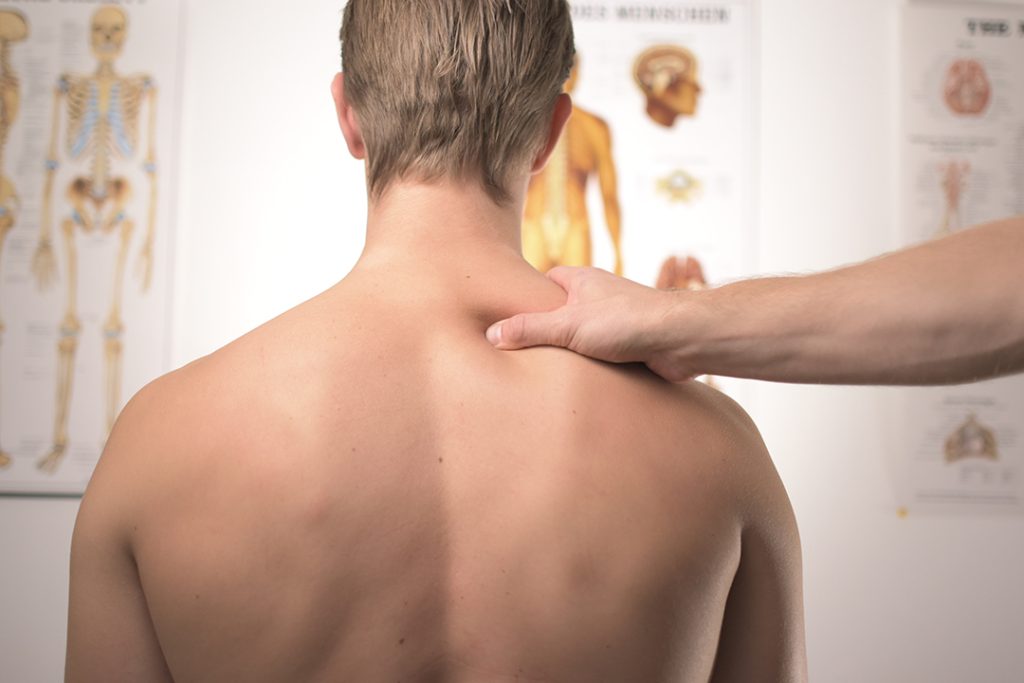WHAT A PAIN!
Back pain is without doubt one of the most common problems we see in our physiotherapy clinic. Statistics claim that up to 80% of us will experience back pain at some time in our lives. For some of us, back pain is sporadic, whilst for others, it’s more persistent. But whatever the frequency and cause of your back pain there are lots of things that can be done to treat it.
WHY DOES MY BACK HURT?
Mechanical issues
Let’s start with the good news – back problems are only occasionally serious business and for most of us back discomfort stems from spinal soft tissues, or sometimes the bones or joints.
Nowadays, it’s common for people to hunch over desks, constantly scroll through phones and tablets, or sit in cars for long periods of time, and many cases of back pain are purely the result of poor posture. Let’s face it, we live in a fast-paced world where remembering to sit and hold ourselves correctly is often the last thing on our minds.
Stress is another modern-day yet common cause of back pain. Did you know that simply feeling tense or run down can play havoc with your back?
For others, back problems occur because of moving or lifting awkwardly, or can be the result of a sprain or strain.
All of the above examples are of what we call ‘mechanical’ back pain and cover the majority of back problems that we’ll see at W5Physio. It’s important to remember that mechanical difficulties will normally start to get better within a few weeks. And physiotherapy can definitely help in your recovery.

Other conditions
Of course, non-mechanical causes of back pain sometimes occur too. Non-mechanical problems often present with other symptoms such as stiffness, numbness, tingling or weakness.
They include sciatica – nerve irritation that causes pain to radiate in the lower back, buttocks and down the leg into the feet; spondylolisthesis (easy for you to say!) which is the result of a bone in the spine slipping out of position; a prolapsed (slipped) disc, where spinal cartilage presses on a nerve; or ankylosing spondylitis which is basically the swelling of joints in the spine.
Again, all of these conditions will benefit from physio and visiting your doctor or one of our physiotherapy professionals (who are used to seeing these kinds of problems daily) can diagnose you properly and advise of the best course of action.
Infrequently, back pain is the result of something more serious. An infection, cancer, broken bone or cauda equina syndrome (severe compression of nerves in the lower back) are all examples, but they’re extremely rare. Again, visit us for an accurate diagnosis if you’re concerned.

TIPS FOR TREATING YOUR BACK PAIN
As we’ve identified above, there are many reasons why you could be experiencing soreness in your back. And that’s why it’s important to have a professional identify the exact underlying cause.
Generally, though, there is some ‘rule of thumb’ when it comes to alleviating your back pain. Here are our top tips:
- Don’t stop moving
Even if the pain seems to be worse on moving, aim to continue with your normal activities, where possible. Steadily and gradually increase your activity and try not to fear twisting or bending. Studies have shown that people who remain active are likely to recover more quickly.
- Try some stretches
Trying some gentle stretches can take the edge off your pain and loosen tight muscles. Our physios can provide you with a programme of stretches to do in the comfort of your own home. Stretching even when you don’t have pain is a great way to prevent future back problems occurring.
- Hot and cold treatment
Some people find that heat, such as a warm bath or hot water bottle helps their back pain. Others find that putting something cold on it (like an ice pack), is better – never put ice directly onto the skin though! Our physios can advise on whether hot or cold treatment or a combination of both, is best for your specific condition, so give us a call.
- Get professional help
Backs can be tricky things! And with so many diagnoses, it’s safest to get a professional opinion to ensure you’re taking the right steps to aid your recovery. Seek advice from a physiotherapist or your GP.
If you’re experiencing acute or chronic back pain, make an appointment with us today. Our physiotherapists have a wealth of experience in physiotherapy, acupuncture and pilates.
Our tailored treatment plans have great success rates and we’ll not only help to get you back on the road to recovery but prevent future back problems too.






